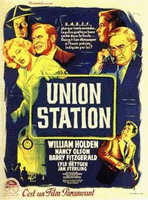 Sometimes when Hollywood remakes a classic, the classic actually emerges on DVD from a period of oblivion, but that’s never happened to Ransom! Neither the 1956 film about a kidnapped boy nor the 1953 live teleplay are available on DVD (Region 2 land fares better), but Ransom, Ron Howard’s 1996 remake, is (albeit only in an unnecessarily longer Director’s Cut).
Sometimes when Hollywood remakes a classic, the classic actually emerges on DVD from a period of oblivion, but that’s never happened to Ransom! Neither the 1956 film about a kidnapped boy nor the 1953 live teleplay are available on DVD (Region 2 land fares better), but Ransom, Ron Howard’s 1996 remake, is (albeit only in an unnecessarily longer Director’s Cut).It might be rights issues, or apathy, but whatever excuse is restricting the ’56 film to the realms of TV (such as TCM) is frankly criminal, because it’s that good. It bears one of Glenn Ford’s best performances, and a superb, sharp script by Richard Maibaum and Cyril Hune – authors of the original teleplay (which I would love to see).
The script is so good that two scenes where retained, almost verbatim, for Howard’s remake, and director Alex Segal stayed away from score and flashy montages and carried over some of the conventions of live TV by putting the camera smack in the center of Ford’s anguish as he struggles with the decision to pay or not pay the ransom that may or may not free his beloved son.

Rudolph Maté’s Union Station (1950) is an equally compelling kidnapping tale set moments after the daughter of a similarly wealthy father is snatched, and one could argue the writers of Howard’s Ransom remake interpolated Union Station’s ruthless kidnappers – the greedy leader, his overly sympathetic moll – because the evil force that took the boy in Segal’s drama is never seen.
Starring William Holden, Union Station is about chasing down facts and clues and getting the kidnappers before the money is dropped off. Maté used some excellent locations, including Los Angeles’ railway station and small pockets of Chicago’s Tunnel Railroad, which was shuttered a few years later. In terms of a docu-crime style, Union Station is kind of the kissing cousin of Maté’s chilling D.O.A., made the same year.
Although it shows up quite often on TCM, Union Station is reportedly coming to DVD via Olive Films around September (originally June) of 2010. Much like the spate of Paramount titles that were licensed to Legend Films, the new wave contains a neat mix of classic and cult titles:
If it’s a true go, a number of rare titles will finally be out on DVD, including Andrew Marton’s Crack in the World, Joseph E. Levine’s rival Harlow biopc, Raquel Welch’s vanity film Hannie Caulder (with its great Ken Thorn score), the taut drama Rope of Sand, Tennessee Williams’ Summer and Smoke (featuring a lovely Elmer Bernstein score), and a trio of Otto Preminger oddities: the ‘comedy’ Skidoo (which TCM has been showing in widescreen), Such Good Friends, and the sweaty racial drama Hurry Sundown.
Some film fans may have noticed a lot of Paramount catalogue titles have gone out of print, such as Brian De Palma’s Obsession, David Lynch’s Elephant Man, The Red Tent, and Lipstick. Those by major directors will probably return to DVD alongside Blu-ray editions (Elephant is a perfect candidate for HD), whereas lesser titles may kind of be gone.
Comparatively fewer are fewer classics are coming out on DVD. Fox seems content to license titles to Region 2 labels but here in North America their classics seem to be restricted to TV airings, including their own HD channel and digital download platform, whereas Paramount still isn’t sure what to do with their library.
The Legend Films deal from around 2007-2008 (which included goodies like Phase IV) felt like a test for Paramount: see whether revenues from licensed titles are similar to those derived from in-house product, and maybe the Olive deal is another test to see whether licensing – which is no new idea – is the most cost-effective way to earn cash up front. Moreover, licensing would also save Paramount from having to worry about returned physical product idling in the warehouse.
Perhaps the reason one finds more classics being licensed to European labels on a country-by-country basis is that the studios think it’s a smaller market, and English language markets are still largely controlled by the major labels, hence Fox distributing its own catalogue in the U.S. and Canada, but licensing titles like John Huston’s The Roots of Heaven (1958) or Roy Ward Baker’s colour noir thriller Inferno (1953) to native Spanish labels.
Universal, which owns a massive catalogue (including pre-WII Paramount titles) has been spotty with classics on DVD. Some titles have been licensed as exclusive Warner Archives releases (U.S. only, yet again), others as overpriced, bare bones entries in their Backlot series (which Canadian vendors have to import, such as Trail of the Lonesome Pine).
And then there are a few titles coming out of Germany as newly transferred special editions.
KOCH Media in Germany has being picking through some of Universal’s TV (The Bionic Woman series) and film catalogue. Whereas the John Wayne-Howard Hughes cult films The Conqueror (1956) and Jet Pilot (1957) are available here as heavily compressed transfers in Universal’s budget-line John Wayne set, KOCH gave the two special editions in Germany, and coming shortly will be a review of Jet Pilot, which features a lovely 1.78:1 anamorphic transfer.
I’m still mulling over buying The Conqueror, though. It’s the idiot cousin of Jet Pilot, but it’s two hours of pure awfulness, and features one of Victor Young’s worst scores.
- MRH







0 comments:
Post a Comment